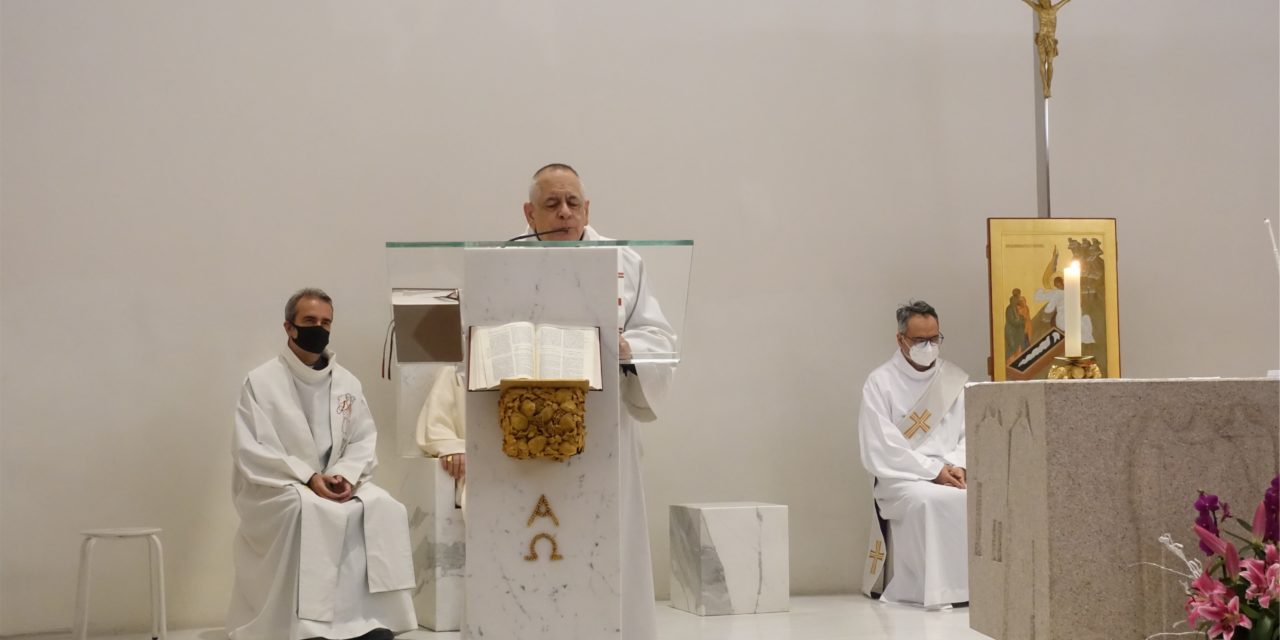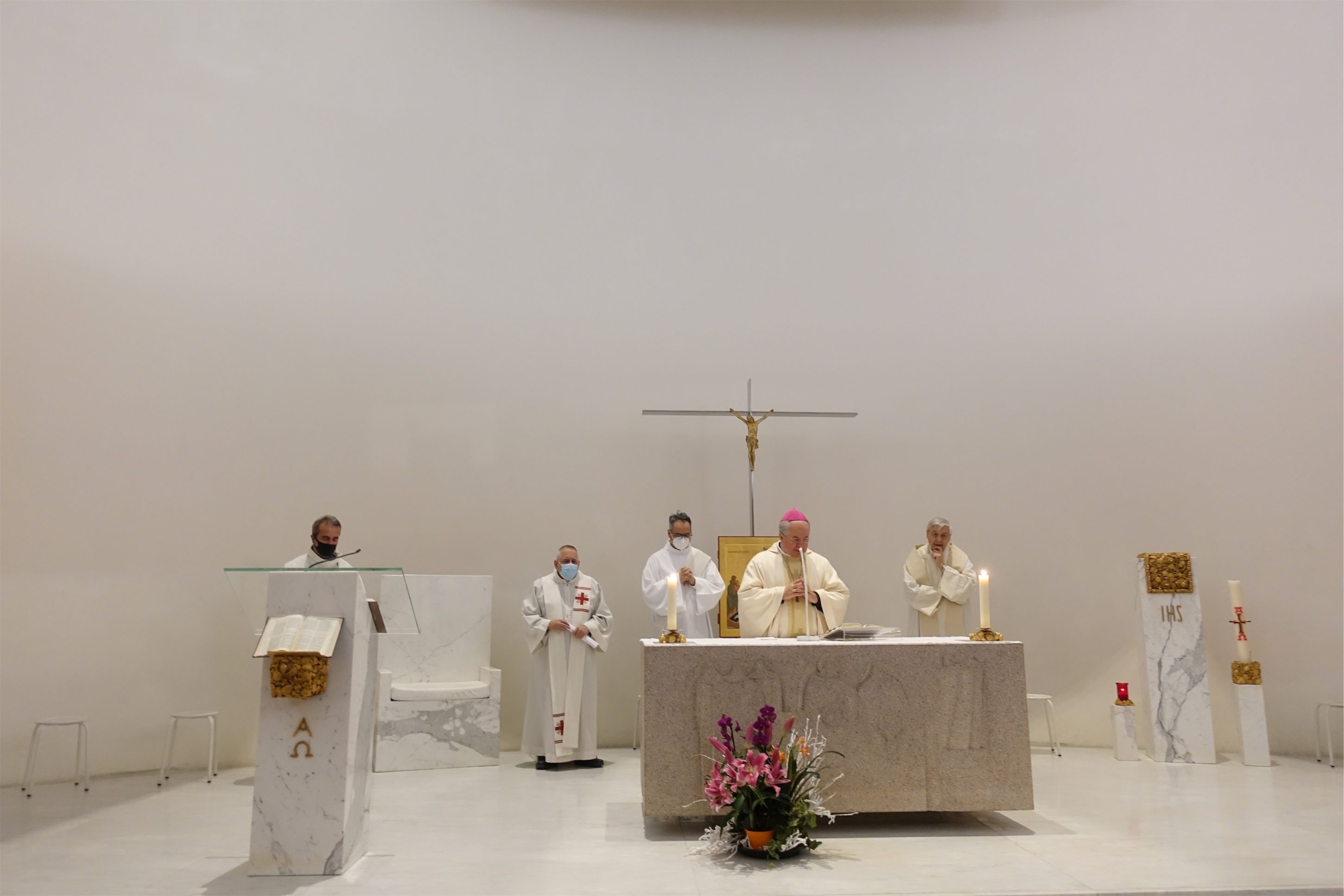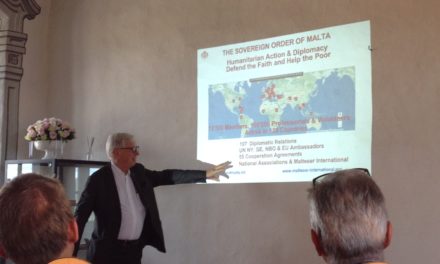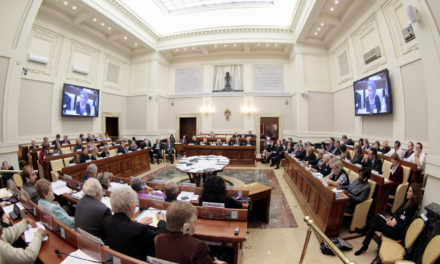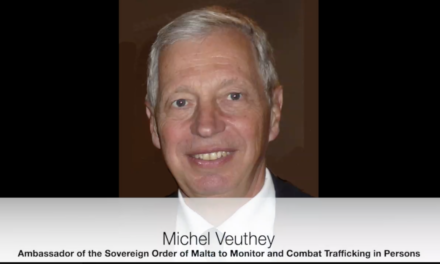Homily for Feast of St. Josephin Bakhita
and World Day of Prayer and Reflection against Human Trafficking
Church of Sainte Trinité, Geneva, Switzerland
By Msgr. Robert J. Vitillo, 8 February 2021
Scripture Readings: Monday, 4th Week in Ordinary Times – Genesis 1:1–19; Psalm 103; Mark 6:53–56
Your Excellencies, the Apostolic Nuncio and other Representatives to the United Nations in Geneva, my brother priests, Revered Religious and all my sisters and brothers in the Lord,
Perhaps upon first listening, the relationship between the Scripture Readings, assigned for today, and the immediate purpose of our assembly this evening, may not seem self-evident. But, with a few moments of joint reflection and open hearts and souls, we can be assured of God’s grace and presence among us as we discern his Word and celebrate once again the life, death, and resurrection of His Son and Our Lord Jesus Christ. Indeed, by sharing His very Body and Blood through this Eucharistic sacrifice and memorial, we enter fully into the source and summit of all our prayer.
The first reading, taken from the beginning of the Old Testament, recalls the decisive action by the Creator God to form the heavens and the earth. We are told that God created light “and saw that it was good.” We will follow the Creation Story tomorrow as well, when we will hear that God completed this phase of humanly unimaginable creative power by fashioning man and woman in his own image and likeness and, once again, recognizing this fruit of His action as “very good”.
But, as we know, God gifted women and men with free will, and, both at the origins of our universe and to the present time, we often abuse that will by rejecting God’s ever-present love and preferring to act under cover of darkness, deceit, and disrespect, both for our common home in this world, and for our sisters and brothers in this human family.
Most of us have assembled out of deep concern and overwhelming sadness at the dark and sinful action that is constituted by human trafficking and other forms of modern-day slavery. In fact, our Holy Father Pope Francis has joined his predecessors by, correctly and, without hesitation, labelling this heinous action as a crime against humanity.
St. Josephine Bakhita, whose memory and holy life we honour today, experienced this crime in her very body, mind, heart, and spirit. Born in Sudan, she was kidnapped by slave traders, beaten and physically scarred for life, and sold five times in slave markets. Finally, she was bought by an Italian merchant, trafficked to Italy, and served the family of an Italian diplomat, who loved her deeply and eventually helped her to discover a “master”, or paron, as she learned the word in Venetian dialect, who is the source of all good, which became manifest on this earth, through the loving sacrifice of His only Son, the Emmanuel, God-with-us. This was the love for which she thirsted for her entire life but which she never hoped to experience. And she was even more amazed that this paron had Himself been flogged and nailed to a cross – in order to overcome all evil, sin, and death forever, and to invite her and all of us to a share in the divine and eternal goodness of Paradise. Josephine had to overcome more barriers in life- to receive Baptism, to confront the Italian authorities in order to seek emancipation, and to be accepted into the religious congregation of the Canossian Sisters.
Sr. Josephine put her religious life into action by promoting missionary vocations in Italy – she wanted so desperately to preserve the charism that helped her to experience liberation, by introducing her to the kind, meek, and gentle Master, the Lord Jesus Christ. As Pope Emeritus Benedict XVI described her vocation, “The hope born in her she could not keep to herself; this hope had to reach many, to reach everybody.”
Today, under the heavenly patronage and protection of St. Josephine Bakhita, we challenge ourselves to confront the complex, overwhelming, painful, hurtful, destructive phenomenon of human trafficking. In doing so, we dare to literally look evil in the eye. For decades upon decades, after slavery was officially banned in many parts of the world, we deceived ourselves by thinking that it had been eradicated by mere legislative or judicial fiat. But thanks to the courageous witness of many believers in Jesus’ Gospel and in other religious traditions, among whom the Catholic Religious Sisters have played a heroic role, we now are keenly and painfully aware of the millions of girls and boys, women and men whose God-given dignity is denied and abused, on this very day, and throughout the entire world, and who are subjected to the same physical, emotional, and spiritual scarring that was suffered, during the nineteenth century by St. Josephine Bakhita.
As we join in humble prayer today, let us not give way to doubts and fears about our ability to face such shrouded, entwined, but incredibly lucrative, global evil as human trafficking. Let us remind ourselves that, by presenting his own back to be scourged, and his own arms and body to hang on the Cross, Jesus restored light to a world darkened by sin, and offered the gift of eternal life to his sisters and brothers whose bodies and souls are subject to earthly suffering and death. Let us touch, spiritually, the cloak of Jesus, as did his first followers, since the Gospel passage for today tells us that, in so doing, they were cured. And let us journey with, and listen to, the survivors of human trafficking, and be courageous enough to learn from them how we could prevent this crime from perpetuating itself through our all-too-prevalent “culture of indifference” to the physical, social, economic, and social peripheries that continue plague our fragile world.
I will close with the words of Pope Francis, ““We Christians believe and know that Christ’s resurrection is the true hope of the world, the hope that does not disappoint … it is the power of that love which humbles itself and gives itself to the very end, and thus truly renews the world … it bears the fruits of hope and dignity … where there are migrants and refugees (so often rejected by today’s culture of waste), and victims of the drug trade, human trafficking, and contemporary forms of slavery.(Easter, 2018).”
TRADUCTION EN FRANÇAIS
Vos Excellences, le Nonce Apostolique et les autres Représentants des Nations Unies à Genève, mes frères prêtres, les Religieux Révérendissimes et toutes mes sœurs et frères dans le Seigneur,
Peut-être qu’à première vue, la relation entre les lectures des Écritures, prévues pour aujourd’hui, et le but immédiat de notre assemblée de ce soir ne semble pas évidente. Mais, avec quelques moments de réflexion commune et d’ouverture des cœurs et des âmes, nous pouvons être assurés de la grâce et de la présence de Dieu parmi nous alors que nous discernons sa Parole et que nous célébrons une fois de plus la vie, la mort et la résurrection de son Fils et de notre Seigneur Jésus-Christ. En effet, en partageant Son Corps et Son Sang même à travers ce sacrifice et ce mémorial eucharistique, nous entrons pleinement dans la source et le sommet de toute notre prière.
La première lecture, prise au début de l’Ancien Testament, rappelle l’action décisive du Dieu créateur pour former les cieux et la terre. Il nous est dit que Dieu a créé la lumière “et qu’il a vu qu’elle était bonne”. Nous suivrons également l’histoire de la création demain, lorsque nous apprendrons que Dieu a achevé cette phase de puissance créatrice humainement inimaginable en façonnant l’homme et la femme à son image et à sa ressemblance et, une fois encore, en reconnaissant ce fruit de Son action comme “très bon”.
Mais, comme nous le savons, Dieu a donné aux femmes et aux hommes le libre arbitre et, tant aux origines de notre univers qu’à l’heure actuelle, nous abusons souvent de cette volonté en rejetant l’amour omniprésent de Dieu et en préférant agir sous le couvert de l’obscurité, de la tromperie et du manque de respect, tant pour notre foyer commun dans ce monde que pour nos sœurs et frères de cette famille humaine.
La plupart d’entre nous se sont rassemblés en raison de la profonde inquiétude et de la tristesse écrasante que suscite l’action sombre et pécheresse que constituent la traite des êtres humains et les autres formes d’esclavage moderne. En fait, notre Saint-Père le Pape François a rejoint ses prédécesseurs en qualifiant, à juste titre et sans hésitation, cette action odieuse de crime contre l’humanité.
Sainte Joséphine Bakhita, dont nous honorons aujourd’hui la mémoire et la vie sainte, a vécu ce crime dans son corps, son esprit, son cœur et son âme. Née au Soudan, elle a été kidnappée par des marchands d’esclaves, battue et marquée à vie, et vendue cinq fois sur des marchés d’esclaves. Enfin, elle a été achetée par un marchand italien, puis trafiquée vers l’Italie, et a servi la famille d’un diplomate italien, qui l’aimait profondément et qui l’a finalement aidée à découvrir un “maître”, ou paron, comme elle l’a appris en dialecte vénitien, qui est la source de tout le bien, qui s’est manifesté sur cette terre, par le sacrifice d’amour de son Fils unique, l’Emmanuel, Dieu-avec-nous. C’était l’amour dont elle avait soif toute sa vie, mais qu’elle n’espérait pas connaître. Et elle était encore plus étonnée que ce paron ait lui-même été fouetté et cloué sur une croix — afin de vaincre tout le mal, le péché et la mort pour toujours, et de l’inviter, elle et nous tous, à participer à la bonté divine et éternelle du Paradis. Joséphine a dû surmonter d’autres obstacles dans sa vie pour recevoir le baptême, pour affronter les autorités italiennes afin de chercher à s’émanciper et pour être acceptée dans la congrégation religieuse des Sœurs Canossiennes.
Sœur Joséphine a mis sa vie religieuse en action en promouvant les vocations missionnaires en Italie — elle voulait tellement préserver le charisme qui l’a aidée à faire l’expérience de la libération, en la présentant au gentil, doux et gentil Maître, le Seigneur Jésus-Christ. Comme le Pape émérite Benoît XVI l’a décrit dans sa vocation, “l’espérance née en elle, elle ne pouvait pas la garder pour elle ; cette espérance devait atteindre beaucoup de gens, atteindre tout le monde”.
Aujourd’hui, sous le patronage et la protection céleste de Sainte Joséphine Bakhita, nous nous mettons au défi d’affronter le phénomène complexe, accablant, douloureux, blessant et destructeur de la traite des êtres humains. Ce faisant, nous osons littéralement regarder le mal dans les yeux. Pendant des décennies, après l’interdiction officielle de l’esclavage dans de nombreuses régions du monde, nous nous sommes trompés nous-mêmes en pensant qu’il avait été éradiqué par une simple décision législative ou judiciaire. Mais grâce au témoignage courageux de nombreux croyants en l’Évangile de Jésus et en d’autres traditions religieuses, parmi lesquels les religieuses catholiques ont joué un rôle héroïque, nous avons aujourd’hui une conscience aiguë et douloureuse des millions de filles et de garçons, de femmes et d’hommes dont la dignité donnée par Dieu est niée et bafouée, en ce jour même et dans le monde entier, et qui sont soumis aux mêmes cicatrices physiques, émotionnelles et spirituelles que celles qu’a subies, au XIXe siècle, Sainte Joséphine Bakhita.
Alors que nous nous joignons à l’humble prière d’aujourd’hui, ne cédons pas aux doutes et aux craintes concernant notre capacité à faire face à un mal mondial aussi enveloppé, enchevêtré, mais incroyablement lucratif que la traite des êtres humains. Rappelons-nous qu’en présentant son propre dos pour être flagellé, et ses propres bras et corps pour être pendu à la croix, Jésus a rétabli la lumière dans un monde assombri par le péché, et a offert le don de la vie éternelle à ses sœurs et frères dont le corps et l’âme sont soumis à la souffrance et à la mort terrestres. Touchons, spirituellement, le manteau de Jésus, comme l’ont fait ses premiers disciples, car le passage de l’Évangile pour aujourd’hui nous dit que, ce faisant, ils ont été guéris. Et voyageons avec les survivants de la traite des êtres humains, écoutons ce qu’ils ont à dire, et ayons le courage d’apprendre d’eux comment nous pourrions empêcher ce crime de se perpétuer à travers notre trop fréquente “culture de l’indifférence” à l’égard des périphéries physiques, sociales, économiques et sociales qui continuent de sévir dans notre monde fragile.
Je terminerai par les mots du pape François : “Nous, les chrétiens, croyons et savons que la résurrection du Christ est la véritable espérance du monde, l’espérance qui ne déçoit pas … c’est la puissance de cet amour qui s’humilie et se donne jusqu’au bout, et donc qui renouvelle vraiment le monde …”. … elle porte les fruits de l’espérance et de la dignité … là où il y a des migrants et des réfugiés (si souvent rejetés par la culture du gaspillage d’aujourd’hui), et des victimes du trafic de drogue, de la traite des êtres humains et des formes contemporaines d’esclavage (Pâques 2018)”.

